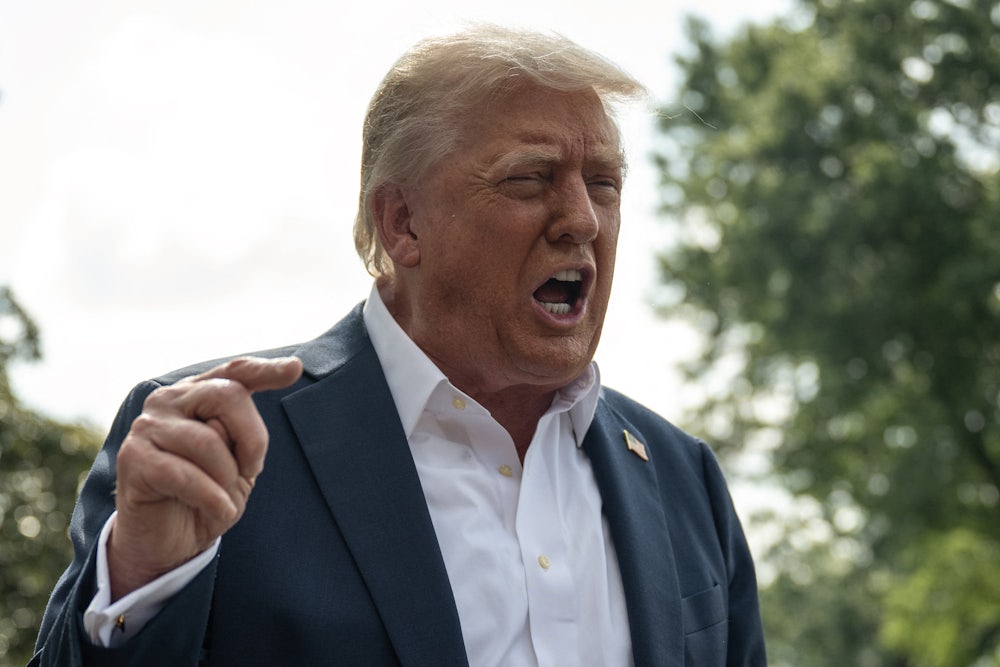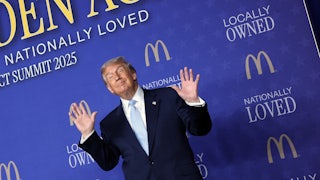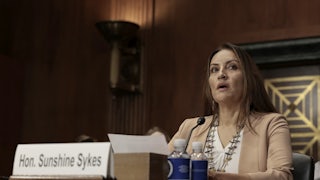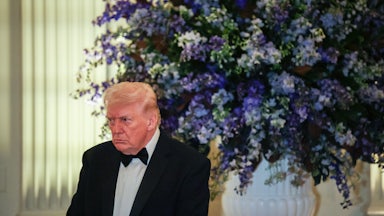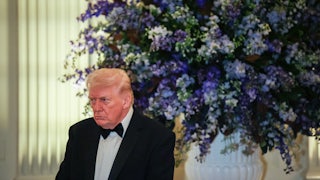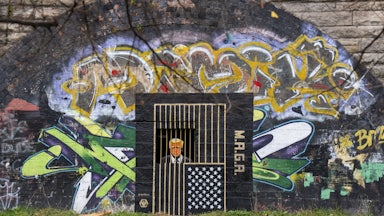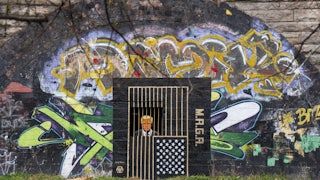For all the ways that MAGA has departed from established political norms, there is a throwback quality to President Trump’s extraordinarily hostile trade war. His ham-fisted efforts to shore up global U.S. hegemony in the face of growing competition, and Republican attempts to justify them, harken back to Washington’s Cold War insecurities, which in the name of containing communism produced enormous global suffering. A key difference, of course, is that Trump isn’t only waging his war against America’s nearest competitor, China. On any given day, a different nation could face his mercurial wrath.
Right now, that nation is Brazil. Trump on Wednesday posted a letter on Truth Social addressed to President Luiz Inácio Lula da Silva, threatening to slap 50 percent tariffs the country starting August 1 unless it ends the “witch hunt” against former President Jair Bolsonaro and reverses a Supreme Court ruling that U.S. social media companies can be held financially liable if users’ posts violate the country’s speech laws.
The personal angle here is familiar by now: Bolsonaro, a far-right extremist whose central political position prior to his surprise 2018 election was a dogged defense of Brazil’s brutal military dictatorship, is facing potential imprisonment for allegedly attempting a coup. Despite this, or perhaps because of it, Trump sees in Bolsonaro a fellow traveler being persecuted by familiar foes—the courts, the opposing party, the “deep state.” The truth, of course, is that they both brought trouble on themselves with their reckless and illegal behavior; the only difference is that Bolsonaro may actually be held accountable, while Trump got away scot-free.
Trump surely doesn’t see it that way, and there is little doubt that his grievances against the U.S. judiciary, which has blocked some (but hardly all) of his most ambitious authoritarian moves this year, are feeding his desire to lash out against the Supreme Court in Brazil. But that is not the only consideration here. On July 6-7, leaders and representatives of BRICS countries—which stands for Brazil, Russia, India, China, and South Africa, but the coalition now counts 10 members—met in Rio de Janeiro for the seventeenth annual meeting. While careful to minimize any direct reference to the U.S., the group issued a shared declaration criticizing the “indiscriminate rising of tariffs,” a thinly veiled rebuke of Trump’s trade policy. In response, Trump threatened an additional 10 percent tariff on any country aligning with what he called “anti-American” BRICS policies.
It was in this context, two days after the BRICS summit concluded, that Trump posted his letter to Lula, which was a victory for Bolsonaro’s inner circle. Earlier this year, the ex-president’s son Eduardo, a member of Congress, relocated to the U.S. to lobby MAGA full-time on his father’s behalf. Little seemed to come of those efforts until the BRICS summit. Indeed, it was reportedly the meeting in Rio that prompted Trump to act on his supplicant’s request—a vivid reminder of the president’s tendency to mix decisions of weighty geopolitical consequence with personal caprice.
Trump didn’t mention BRICS in his letter to Lula, but his acolytes were quick to try to thread the various messages being sent. Republican Senator Eric Schmitt told Politico that “BRICS is a problem and I’m glad that [Trump’s] addressing it squarely. This is an effort by other countries to undermine the United States of America and, quite frankly, our allies.” It’s an odd statement, given that a number of BRICS members are themselves U.S. allies, notably India and Saudi Arabia. But Schmitt went even further. In a direct echo of yesteryear’s cold warriors, he added, “Countries are going to need to start to choose: Are they going to align themselves with a malign communist regime that has concentration camps or the United States?”
Most of the world rejects this binary choice, as well as Washington’s self-proclaimed authority to issue such ultimatums. Residents of other countries are usually quicker to recognize U.S. hypocrisy than American officials are to acknowledge any. (The U.S., home to Alligator Alcatraz, is in no position lately to be lecturing other countries about concentration camps.) As the BRICS bloc gradually consolidates itself as a viable alternative to the postwar U.S.-led global order—with its own infrastructure bank, think tanks, and annual fora—Washington will be faced with the question of how to respond. Will it adapt to a multipolar order it cannot fully control or insist on increasingly forceful displays of raw power?
The answer is obvious to Steve Bannon, MAGA’s leading anti-globalist, who said Brazil can easily solve its problem: “If you drop the trial and drop the charges, the tariffs go away.” When asked how this policy approach—which treats tariffs like sanctions—differed from extortion, he remarked that “it’s MAGA, baby … It’s a brave new world.” Effectively, Trump and his minions are demanding that the judicial system of Latin America’s largest nation, the fourth-biggest democracy in the world, do his bidding or suffer the consequences—specifically, a potential economic calamity that would impoverish millions of Brazilians. Furthermore, in addressing his letter to Lula, Trump is implying that the chief executive must be the one to break Brazil’s institutional order, even though the letter’s main complaints pertained to decisions by the judiciary.
Trump’s message to Brazil, and really all BRICS nations, is that he will not brook any dissatisfaction with unilateral U.S. policy, and indeed will punish any nations that dare to strengthen ties to better protect themselves from that policy—a threat that naturally makes such cooperation more appealing, and perhaps even existentially necessary. The prospect of the United Nation or World Trade Organization reining in Trump’s callous measures are remote at best. In his own way, Trump is making the case for BRICS more clearly than Lula ever could.
